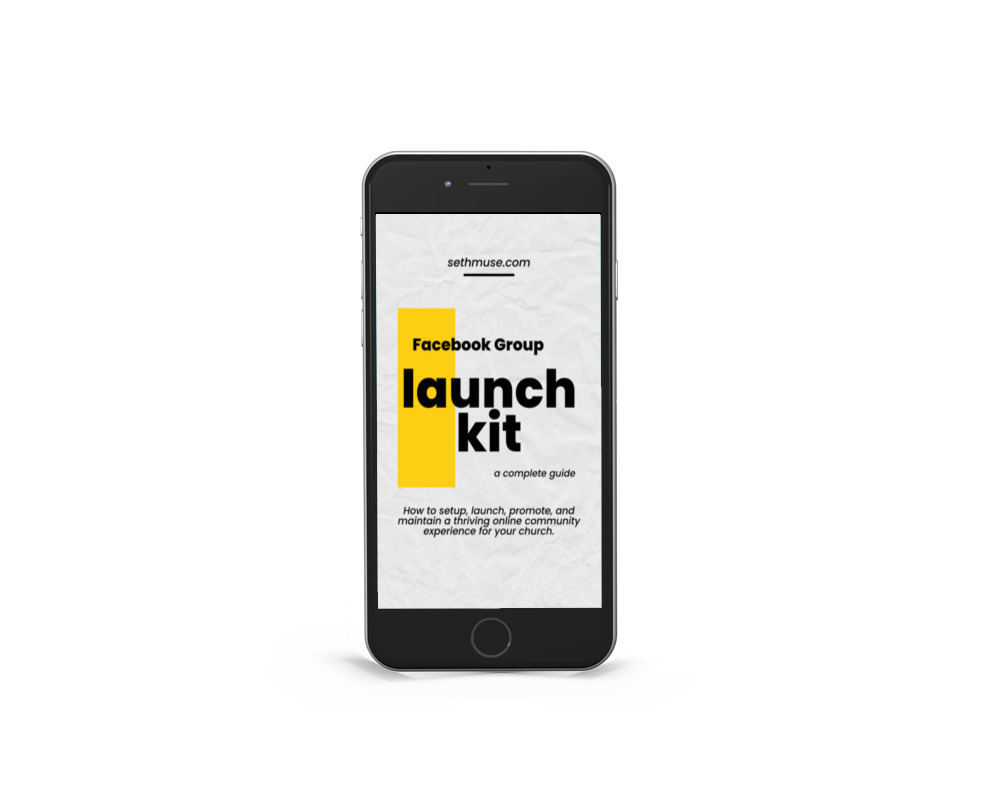Some churches just aren’t ready and may never be ready for Facebook Groups, but some just need your know-how and computer wizardry to set them up and off they would go! That’s what’s happened at my church. I’ve never seen a more active and responsive social media crowd. Trust me, I know how #blessed I am with that. We currently have 25 active to somewhat active Facebook groups connected to our church.
Having the freedom to try this experiment allows me to try some things, learn some things, and then tell you the things, so if you want to start a successful Facebook Group strategy, here’s what we did that seems to be working right now.
Identify the Purpose of the Facebook Groups
Right now, we have our groups divided into four categories: Campus, Ministry, Interest, and Volunteers. Campus groups are the front door for online community at the campus level. They are run by campus pastors, their staff, and resourced by our communications team.
Ministry groups are like the young adult group, or senior adult group that represent a ministry of our church. They’re kind of the online “official” place to connect with that ministry on Facebook. It’s Facebook official.
Interest groups are things like our Running group for people who do crazy things like run. There’s also a motorcycle enthusiast group that meets up to ride across Texas (with our pastor) and they coordinate through that group. We also have a business/entrepreneurs group where business owners at our church can network and talk shop. These have the greatest potential to be outreach-oriented groups.
Last, there are the volunteer groups. Ministry leaders run these groups and use them to connect with their volunteer teams. These are groups for your volunteer teams to connect. They’re great for sharing stories, training, organizing food for events, etc.
Imagine a group of student leaders, where the youth pastor goes live every Tuesday to walk you through the small group lesson you got on Monday so you can explain it really well on Wednesday? Or a connections group that creates training videos on how to greet and where to stand when you hold the door? Lots of great applications of a group for leadership. Now, if your team just didn’t think Facebook was stupid….amiright?
Set Up the Facebook Group Correctly
Don’t let someone else set the group up; you do it. You set up the type of group, turn on social learning units, change the url to make sense with branding, and get the header image correct and nice-looking. Now, when people start joining the group, it’s ready to go and works like it’s supposed to.
If you’re taking over a group that already exists, you’ll have to be an admin to do this, but you need to link the group to your church’s main page. Then, make sure that groups are at the top of your content order on your page so it’s the first thing a visitor will see. Now you’re set.
Find a champion
If you’re not going to run the group, you need someone who will maintain it without you before you launch it. Nobody likes a dead group. Well, unless it’s a group of snakes. I like a dead group of snakes. I do NOT like a live group of snakes.
Talk to this person about what the group is for, set expectations for how many times a week they need to post something, and then give them your list. What list, you ask? Why the list of content ideas you already came up with for them to reference when they don’t have anything to post, of course! If you need help, I’ve got a free pdf that may help you with that.
Talk about the Facebook Groups Elsewhere
If you don’t tell your people that there are groups to join, then they won’t join them.

Make a slide, have the pastor say something about the groups, or even do what I did and make a web page that lists all of your groups out divided by category for people to go to and easily find their preferred Facebook groups to join.
But if you don’t mention it in the weekly email or put it in the bulletin or something then they’ll just sit out there and do nothing until they land on the failed experiment pile along with coed Disciple Now Weekends, grown men wearing rompers, and hopefully soon: high-waisted jeans.
Set It, but Don’t Forget It
Once your group gets off the ground and you’ve turned it over to your passionate volunteer or staff member, it’s tempting to put it out of your mind and move on to other things.
But don’t.
Every few weeks, check in the group and see how things are going. Ask the leader how they think it’s going and ask how you can help them. If the posts are not getting great exposure, you may need to jump in and help kickstart some excitement and momentum in the group by being in a Facebook live video or brainstorming some content ideas with your leader.
Please don’t see that as a nuisance.
Empowering others to minister better in the digital space is our job. When I was a youth pastor, I didn’t think about my plan for Instagram or how often I was posting on Facebook. They probably aren’t either and that’s ok. The good news is that they have something to help them that I never had.
They’ve got you.

Launch & manage a successful Facebook Group at your church
Download this kit and let me guide you through the setup process, train your moderators or volunteers, and launch your group successfully.

